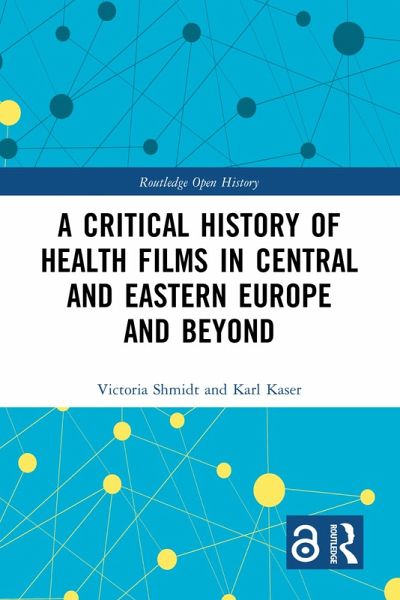
A Critical History of Health Films in Central and Eastern Europe and Beyond (eBook, ePUB)

PAYBACK Punkte
0 °P sammeln!
The burgeoning scholarship on Western health films stands in stark contrast to the vacuum in the historical conceptualization of Eastern European films. This book develops a nonlinear historical model that revises their unique role in the inception of national cinematography and establishing supranational health security.Readers witness the revelation of an unknown history concerning how the health films produced in Eastern European countries not only adopted Western patterns of propaganda but actively participated in its formation, especially with regard to those considered "others": Women an...
The burgeoning scholarship on Western health films stands in stark contrast to the vacuum in the historical conceptualization of Eastern European films. This book develops a nonlinear historical model that revises their unique role in the inception of national cinematography and establishing supranational health security.
Readers witness the revelation of an unknown history concerning how the health films produced in Eastern European countries not only adopted Western patterns of propaganda but actively participated in its formation, especially with regard to those considered "others": Women and the populations of the periphery. The authors elaborate on the long "echo" of the discursive practices introduced by health films within public health propaganda, as well as the attempts to negate and deconstruct such practices by rebellious filmmakers. A wide range of methods, including the analysis of the sociological biographies of filmmakers, the historical reconstruction of public campaigns against diseases and an investigation into the production of health films, contextualizes these films along a multifaceted continuum stretching between the adaptation of global patterns and the cultivation of national authenticities.
The book is aimed at those who study the history of film, the history of public health, Central and Eastern European countries and global history.
The Open Access version of this book, available at http://www.taylorfrancis.com, has been made available under a Creative Commons Attribution (CC-BY) 4.0 International license.
Readers witness the revelation of an unknown history concerning how the health films produced in Eastern European countries not only adopted Western patterns of propaganda but actively participated in its formation, especially with regard to those considered "others": Women and the populations of the periphery. The authors elaborate on the long "echo" of the discursive practices introduced by health films within public health propaganda, as well as the attempts to negate and deconstruct such practices by rebellious filmmakers. A wide range of methods, including the analysis of the sociological biographies of filmmakers, the historical reconstruction of public campaigns against diseases and an investigation into the production of health films, contextualizes these films along a multifaceted continuum stretching between the adaptation of global patterns and the cultivation of national authenticities.
The book is aimed at those who study the history of film, the history of public health, Central and Eastern European countries and global history.
The Open Access version of this book, available at http://www.taylorfrancis.com, has been made available under a Creative Commons Attribution (CC-BY) 4.0 International license.
Dieser Download kann aus rechtlichen Gründen nur mit Rechnungsadresse in A, B, BG, CY, CZ, D, DK, EW, E, FIN, F, GR, HR, H, IRL, I, LT, L, LR, M, NL, PL, P, R, S, SLO, SK ausgeliefert werden.













